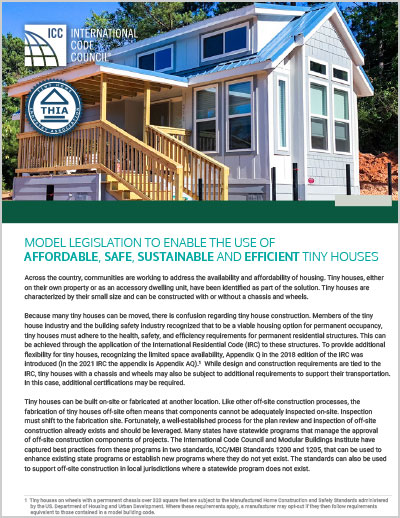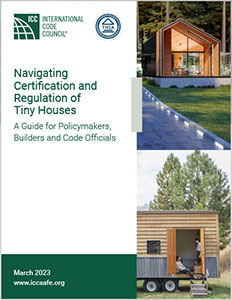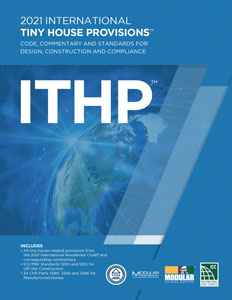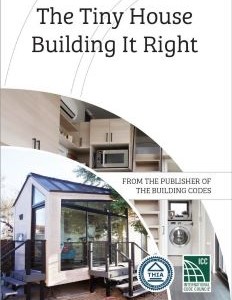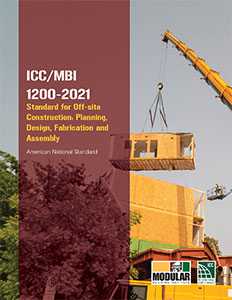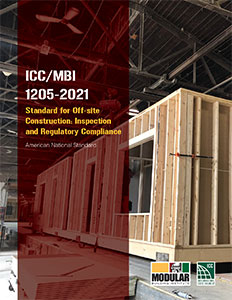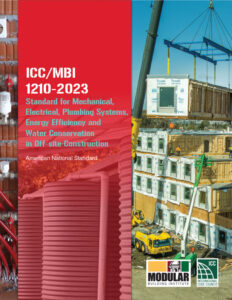
Navigating the Tiny Home Landscape
Tiny houses have garnered considerable attention in recent years, providing a unique lifestyle that addresses many of the challenges faced by new homeowners or those looking to downsize. As communities are opening zoning laws to allow for accessory dwelling units (ADUs) to address the availability of housing, many of these ADUs could be considered tiny houses. Young homebuyers who are looking for affordable options that fit with their sustainable lifestyle identify tiny houses as viable options.
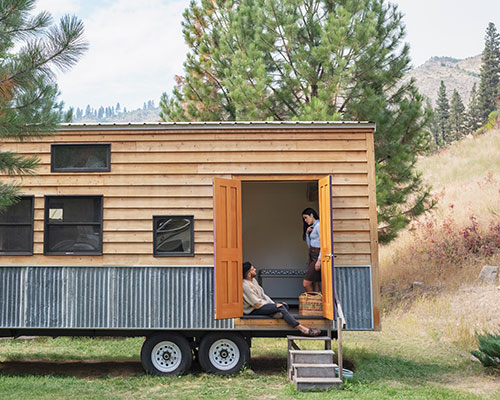
So, what is a tiny house, and what should I know to assure they are safe, resilient and efficient?
As defined in the 2021 International Residential Code (IRC) Appendix AQ, tiny houses are dwelling units that are 400 square feet (37 m2) or less in floor area, excluding lofts.
When it comes to the design and construction requirements for tiny houses, a wide variety of codes and standards are being used. It is important for tiny house designers and builders, code officials, consumers and policymakers to understand the differences and to assure that the criteria matches up with how the tiny house will be used.
Tiny House Resources
The International Code Council has the resources and expertise to deliver the solutions needed to ensure safe, sustainable and resilient construction and use of tiny houses.
Model Tiny House Legislation provides model language for AHJs to ensure the use of affordable, safe, sustainable and efficient tiny homes.
Navigating Certification and Regulation for Tiny Houses resource outlines the applicability of existing codes, standards and other criteria that should be followed to create safe, sustainable and resilient tiny houses.
2021 International Tiny House Provisions outlines the existing codes, standards and compliance mechanisms available for tiny houses. Here is a guide to help navigate when specific requirements should apply to a tiny house.
The Tiny House Building It Right: From the Publisher of the Building Code is a fully illustrated guide for the planning, design, permitting, construction and inspection of tiny houses.
Plan Review and Inspection Services
ICC NTA is an independent third-party certification agency and a leader in plan review engineering and inspections for the tiny house off-site construction industry. ICC NTA's third-party plan review and inspection services help ensure structures meet or exceed building code requirements for quality, safety and performance.
Specific tiny house expertise includes:
- NTA has professional engineers and certified ICC level III plan reviewers and inspectors experienced in modular construction.
- NTA participates in the ICC off-site modular consensus committee.
- NTA is a member of the Tiny Home Industry Association (THIA).
Off-Site Construction Solutions
For tiny houses built in a factory, many states have programs specifically focused on off-site construction, including modular housing. The International Code Council and Modular Building Institute (MBI) developed standards, ICC/MBI Standards 1200, 1205 and 1210, to support consistency in this process.
Visit www.iccsafe.org/offsite for more information.
ICC/MBI 1200-2021 Standard for Off-site Construction: Planning, Design, Fabrication and Assembly
2021 ICC/MBI 1205 Standard for Off-site Construction: Inspection and Regulatory Compliance
2023 ICC/MBI 1210 Standard for Mechanical, Electrical, Plumbing Systems, Energy Efficiency and Water Conservation in Off-site Construction

